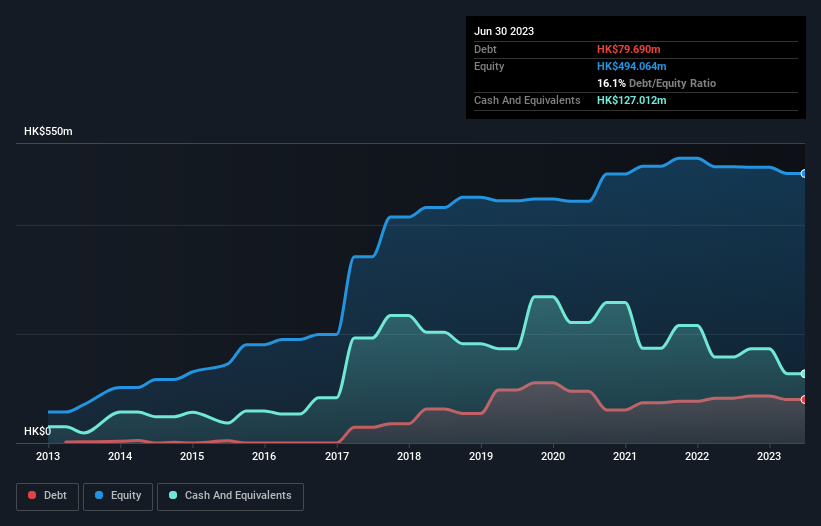- Hong Kong
- /
- Professional Services
- /
- SEHK:1486
Health Check: How Prudently Does C Cheng Holdings (HKG:1486) Use Debt?
Legendary fund manager Li Lu (who Charlie Munger backed) once said, 'The biggest investment risk is not the volatility of prices, but whether you will suffer a permanent loss of capital.' So it seems the smart money knows that debt - which is usually involved in bankruptcies - is a very important factor, when you assess how risky a company is. We can see that C Cheng Holdings Limited (HKG:1486) does use debt in its business. But is this debt a concern to shareholders?
When Is Debt A Problem?
Debt and other liabilities become risky for a business when it cannot easily fulfill those obligations, either with free cash flow or by raising capital at an attractive price. If things get really bad, the lenders can take control of the business. However, a more common (but still painful) scenario is that it has to raise new equity capital at a low price, thus permanently diluting shareholders. By replacing dilution, though, debt can be an extremely good tool for businesses that need capital to invest in growth at high rates of return. When we examine debt levels, we first consider both cash and debt levels, together.
See our latest analysis for C Cheng Holdings
What Is C Cheng Holdings's Debt?
As you can see below, C Cheng Holdings had HK$79.7m of debt, at June 2023, which is about the same as the year before. You can click the chart for greater detail. But it also has HK$127.0m in cash to offset that, meaning it has HK$47.3m net cash.

How Strong Is C Cheng Holdings' Balance Sheet?
Zooming in on the latest balance sheet data, we can see that C Cheng Holdings had liabilities of HK$274.7m due within 12 months and liabilities of HK$22.2m due beyond that. Offsetting these obligations, it had cash of HK$127.0m as well as receivables valued at HK$505.9m due within 12 months. So it can boast HK$335.9m more liquid assets than total liabilities.
This luscious liquidity implies that C Cheng Holdings' balance sheet is sturdy like a giant sequoia tree. Having regard to this fact, we think its balance sheet is as strong as an ox. Simply put, the fact that C Cheng Holdings has more cash than debt is arguably a good indication that it can manage its debt safely. There's no doubt that we learn most about debt from the balance sheet. But it is C Cheng Holdings's earnings that will influence how the balance sheet holds up in the future. So when considering debt, it's definitely worth looking at the earnings trend. Click here for an interactive snapshot.
Over 12 months, C Cheng Holdings made a loss at the EBIT level, and saw its revenue drop to HK$643m, which is a fall of 17%. We would much prefer see growth.
So How Risky Is C Cheng Holdings?
Although C Cheng Holdings had an earnings before interest and tax (EBIT) loss over the last twelve months, it generated positive free cash flow of HK$4.6m. So taking that on face value, and considering the net cash situation, we don't think that the stock is too risky in the near term. There's no doubt the next few years will be crucial to how the business matures. The balance sheet is clearly the area to focus on when you are analysing debt. However, not all investment risk resides within the balance sheet - far from it. To that end, you should learn about the 3 warning signs we've spotted with C Cheng Holdings (including 2 which make us uncomfortable) .
If, after all that, you're more interested in a fast growing company with a rock-solid balance sheet, then check out our list of net cash growth stocks without delay.
New: AI Stock Screener & Alerts
Our new AI Stock Screener scans the market every day to uncover opportunities.
• Dividend Powerhouses (3%+ Yield)
• Undervalued Small Caps with Insider Buying
• High growth Tech and AI Companies
Or build your own from over 50 metrics.
Have feedback on this article? Concerned about the content? Get in touch with us directly. Alternatively, email editorial-team (at) simplywallst.com.
This article by Simply Wall St is general in nature. We provide commentary based on historical data and analyst forecasts only using an unbiased methodology and our articles are not intended to be financial advice. It does not constitute a recommendation to buy or sell any stock, and does not take account of your objectives, or your financial situation. We aim to bring you long-term focused analysis driven by fundamental data. Note that our analysis may not factor in the latest price-sensitive company announcements or qualitative material. Simply Wall St has no position in any stocks mentioned.
About SEHK:1486
C Cheng Holdings
An investment holding company, provides architectural services in Mainland China, Hong Kong, the Middle East and North Africa, Macau, and internationally.
Excellent balance sheet and good value.
Market Insights
Community Narratives



